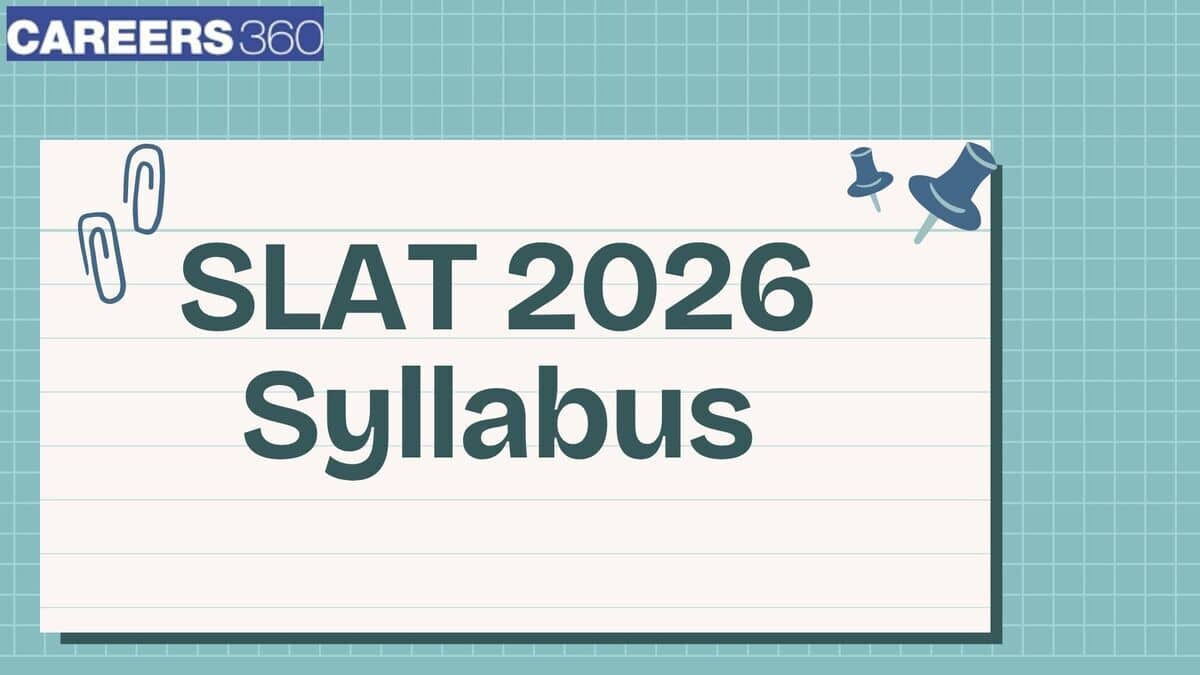Jindal Global Law School Admissions 2026
Ranked #1 Law School in India & South Asia by QS- World University Rankings | Merit cum means scholarships | Early Admissions (Pahse 2) Deadline: 28th Feb’26
Symbiosis International (Deemed) University is conducting the SLAT 2026 exam on December 20 and December 28, 2025 in online mode. The exam is conducted for four Symbiosis Law Schools in Pune, Nagpur, Noida, and Hyderabad. Around 20,000 candidates appear in the SLAT exam every year. The competition is tough, so rigorous preparation is the key to success. To begin with, understanding the SLAT syllabus 2026 immensely helps in charting out a preparation plan in a timely manner. The SLAT 2026 syllabus is divided into five sections: Logical Reasoning, Legal Reasoning, Analytical Reasoning, Reading Comprehension, and General Knowledge.

Each section of the SLAT 2026 syllabus contains 12 questions, with equal weightage given to all sections, making up a total of 60 questions. That being said, the question paper tests the critical thinking, reading and analytical skills in almost all sections. The legal reasoning is one of the most important sections for law aspirants in SLAT 2026, as it also contains questions on critical thinking and legal reasoning. The section-wise details of the SLAT 2026 syllabus are given below.
Sections | Number of questions | Marks |
12 | 12 | |
12 | 12 | |
Analytical reasoning | 12 | 12 |
Reading comprehension | 12 | 12 |
General knowledge | 12 | 12 |
Total | 60 questions | 60 marks |
The SLAT 2026 syllabus tests the comprehensive skills of the students across the different sections. Given below is the detailed section-wise SLAT syllabus.
As per the SLAT 2026 logical reasoning syllabus, it assesses the candidate’s logical and critical thinking skills. The SLAT logical reasoning section carries 20% weightage in the SLAT syllabus and consists of 12 questions. The difficulty level of the SLAT 2026 logical reasoning passage is moderate.
Ranked #1 Law School in India & South Asia by QS- World University Rankings | Merit cum means scholarships | Early Admissions (Pahse 2) Deadline: 28th Feb’26
Among top 100 Universities Globally in the Times Higher Education (THE) Interdisciplinary Science Rankings 2026
The legal reasoning section of the SLAT 2026 syllabus is a test of the candidate’s legal aptitude. The SLAT legal reasoning carries a 20% weightage in the SLAT syllabus and has 12 questions. This section does not require prior legal knowledge but rather tests the candidate's ability to think like lawyers.
The SLAT 2026 analytical reasoning syllabus will test the candidate’s basic mathematical ability and require the candidate to perform numerical calculations. The difficulty level of the analytical reasoning section in the SLAT 2026 syllabus ranges from easy to moderate level. The SLAT analytical reasoning section carries a 20% weightage in the SLAT syllabus and also has 12 questions.
Last Date to Apply: 25th Feb | Ranked #18 amongst Institutions in India by NIRF | Ranked #1 in India for Academic Reputation by QS Rankings | 16 LPA Highest CTC
India's Largest University | BCI approved | Meritorious Scholarships up to 5 lacs |
The questions assess a candidate’s ability to understand, analyse and interpret written passages. The reading comprehension section of the SLAT syllabus will have questions that measure the candidate’s English language proficiency.
The SLAT 2026 syllabus for general knowledge will test the candidate's awareness of current affairs and events such as politics, science and history. The difficulty of the GK section of the SLAT syllabus ranges from moderate to difficult. The SLAT general knowledge section carries 20% weightage in the SLAT syllabus.
SLAT preparation books cover the major areas of the examination. These are important sources for a candidate’s SLAT preparations; these books offer practice questions and explanations of concepts. Candidates can make use of these books to get good marks in the SLAT exam.
Subject | Books |
Logical reasoning | Verbal and Non-Verbal Reasoning by R.S. Aggarwal Objective Logical Reasoning by S Chand |
Legal reasoning | Legal Awareness and Legal Reasoning for the CLAT and L.L.B. Entrance Examinations by AK Bhardwaj Thinking Like a Lawyer: A New Introduction to Legal Reasoning Guide to Symbiosis Law Entrance Test by Disha Experts |
Analytical reasoning | Quantitative Aptitude by R.S Aggarwal Analytical Reasoning by M.K. Pandey Logical and Analytical Reasoning by AK Gupta |
General Knowledge | Pratiyogita Darpan Lucent’s GK Newspapers and magazines |
Reading comprehension | Objective General English by RS Aggarwal Word Power Made Easy by Norman Lewis Objective English for Competitive Examination by Tata McGraw Hill |
On Question asked by student community
Hello,
Symbiosis International University conducts the SLAT (Symbiosis Law Admission Test) entrance examination for admission to the 5 year LLB course. Four Law Schools participate in this process. They select the students after they go through the SLAT and personal interview.
Practicing the previous year questions will help you get
Hi,
You can check the SLAT previous year question papers for Slot 1 and Slot 2 on the Careers360 website. Here's the link :
https://law.careers360.com/articles/slat-2025-question-paper
Hello
The Symbiosis Law Admission Test (SLAT) 2025 results were declared on December 26, 2024 .
While the official cutoffs for Symbiosis Law Schools (SLS) have not been released yet , previous years data suggests that the expected cutoffs for SLS Pune are approximately :
BA LLB (Hons) : 45
Among top 100 Universities Globally in the Times Higher Education (THE) Interdisciplinary Science Rankings 2026
NAAC A+ Accredited | Among top 2% Universities Globally (QS World University Rankings 2026)
Admissions open for B.A. LL.B. (Hons.), B.B.A. LL.B. (Hons.) and LL.B Program (3 Years) | School of Law, MRU ranked No. 1 in Law Schools of Excellence in India by GHRDC (2023)
Excellent curriculum; an impressive range of electives, besides core law courses. Up to 100% merit scholarship on a first-come, first-served basis
Moot Court | Mock trials | Legal Aid Clinic
NAAC A++ Accredited | Ranked #11 by NIRF